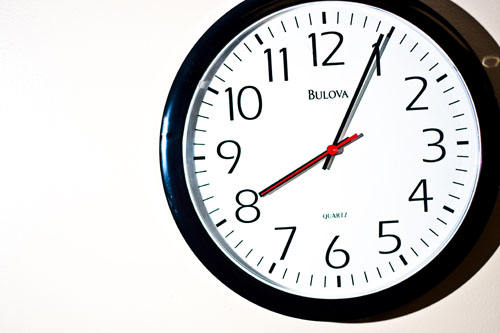
In a singsong tone, Professor Glenn Griffin addresses late arrivers to his class with his own rendition of “Punc-tuaaaalll—iityyyy” as they hurry to their seats. Griffin, creative advertising director, is one of many professors who utilize various tactics to deal with tardiness in their classes.
“As much as it bugs me, I don’t have a tardiness or lateness policy just because I think that is so high school or junior high,” Griffin said. “Part of the reason I never had a policy is because I’m teaching adults who I presume can get to an appointment on time, and you know, class is an appointment.”
Griffin also said he understands stuff happens: “Everybody knows you have a flat tire or somebody cuts you off in traffic or whatever.”
SMU students know all too well that stuff really does happen. Junior Jana Donahoo recalls walking into one of her classes nearly 20 minutes late because she did not wake up to her alarm.
Sophomore William Petefish, a commuter from McKinney, has felt the crunch of traffic and the search for parking spaces before class: “I learned very early to leave at least two hours early.”
Just last semester, freshman Taylor Reed had back-to-back classes in Ford’s Stadium and Fondren Science. “Even when I was running, I would be late,” she said. Reed said her teachers were very helpful by letting her leave a few minutes early or understanding when she arrived a few minutes late.
As understandable as some late arrivals may be, Griffin says there comes a point when it starts to disrupt the class.
“If it’s five people drifting in over the first 20 minutes of the class…it’s distracting to a teacher. I feel people that come in late are sort of infringing upon the experience that other students should be able to have, which is a focused professor.”
Professors are not the only people disturbed by the bell busters. Computers booting up, silencing cell phones, and the removal of jackets and other outdoor clothing by late arrivers frustrates graduate student Will Edmonson.
“It tends to be the same people” he said. “I’ve noticed that I think professors kind of pad the beginning of class because they’re used to that [late arrivals].”
“In the classes where we weren’t doing stuff right away, I would be more likely to stroll in late,” Donahoo added.
Dr. Carie La Ferle of the Termlin Advertising Institute suggested that professors set the tone for arrivals in their classes.
However, when students arrive around 15 minutes late, La Ferle will remind them of her policy by saying “something like, ‘Oh Susan, can I see you after class.’ If you let it go, then the next class, someone else might come in late and think, oh well she got away with it.” It is up to professors to set the tone early in the semester and expect students to follow suit, La Ferle suggested.
Some professors utilize strict lateness policies to combat disruptive delays. Reed said she had a class in which her professor stopped taking attendance at 8:01 every class.
“Everyone in the class was on time to every class,” Reed added.
The issue of arriving on time goes beyond classroom policies. “In the real world, if you’re late habitually, you’re not going to have a job,” Griffin said. “It’s going to happen, I’ve been late to things [too], but the point is, don’t make it a habit so that people can’t depend on you.”









